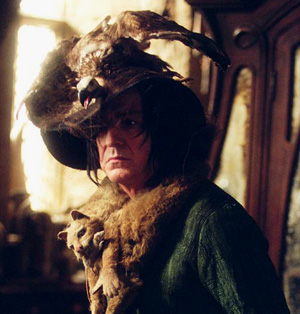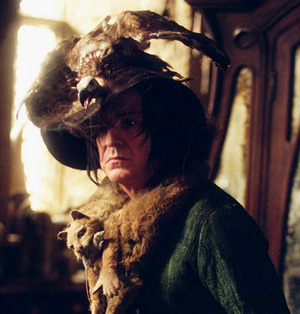Casting The ‘Riddikulus’ Spell On Halloween
 A certain “holiday” is coming up, and recently I read one of the best columns I’ve ever found on the subject. This comes from alastair.adversaria and its three-year-old column to which an online friend had linked, and disarmingly titled, Of Boggarts.
A certain “holiday” is coming up, and recently I read one of the best columns I’ve ever found on the subject. This comes from alastair.adversaria and its three-year-old column to which an online friend had linked, and disarmingly titled, Of Boggarts.
I wish I could reprint the whole column here, and not just because of the Prisoner of Azkaban screencap showing Professor Snape (Alan Rickman) in a dress.
The author’s suggestion: the Harry Potter series, by virtue of its created-world and with its third book’s specific subplot about fighting against certain magical creatures, can help Christians react better to some evils.
When it comes to the accusation of witchcraft, I actually believe that Rowling can help us arrive at a more Christian view of witchcraft. The world that Rowling writes of is a world of Weasleys’ Wizard Wheezes, self-shuffling cards, flying cars, wands hidden in umbrellas, bat bogey hexes, Whomping Willows, Quidditch, owls who deliver the mail, wizards who wear the most ridiculous garments to pass themselves off as Muggles, and the like. It is a delightfully humourous and playful portrayal of a magical world. It is not intended to be taken seriously. The fact that many Christians do take it seriously is a sign that something is badly wrong with us.
This has been long bandied about on Spec-Faith before. I’ve written columns about that myself, after finding out the wrong ideas I had about the Harry Potter series. Christians misrepresenting an author’s books, claiming she practices witchcraft, etc., is a sin, too, and those myths, coupled with failure to learn and implement Biblical discernment, have done some damage.
I’m not saying a Christian who doesn’t read Harry Potter is sinning. But such ideas about how to identify and avoid supposedly bad Things, when applied in other areas — music in church, for example — can be even more harmful, and misidentify where sin originates.
Author “Al” (I couldn’t find a last name) then quotes a scene from Prisoner of Azkaban, in which Professor Lupin, a kind instructor (with, it turns out, a secret) teaches his class about how to deal with Boggarts. These magical creatures are hostile toward humans; upon emerging from wherever dark space it has been hiding, one will shapeshift into whatever it identifies as its opponent’s worst fear. Thus, for Neville Longbottom, a Boggart will turn into Professor Snape; for Harry himself, the creature assumes the shape of a demonic, wraithlike Dementor.
But Lupin says there is one surprising way to fight a shapeshifting Boggart: laugh at it. Picture something hilarious, point your wand at the creature, and utter, “Riddikulus!”
Based on this comes what may be the best three paragraphs of the piece.
The pre-Christian world was full of dark, enclosed spaces for Boggarts to hide. People were plagued and tyrannized by fear, held in its bondage. Satan played with people’s imaginations, holding them in bondage as much (if not far more) by means of the fear within as by external demonic forces without. One of the effects of the gospel was to flood the world with light, driving the Boggarts out from their darkened lairs.
In the light of the gospel we can, like Harry and his classmates, learn to perform the riddikulus charm on our demonically-induced fears. After the gospel has taken effect we can mock things that once terrified us. This is one of the purposes of the celebration of Halloween. The gospel reveals that much of the fear that Satan excited in men prior to the advent of Christ resulted merely from the exaggerated shadows that he cast in the darkness. Now that light has come the shadows are removed and Satan is reduced to a far less terrifying stature. We can begin to laugh at the shapes that we once saw in the shadows.
Whilst there are undoubtedly evil forces at work in our world — Harry’s world contains Dementors and Death Eaters, not just Boggarts — we need to learn that many of the terrors that haunt us are merely products of our fearful imaginations. Satan loves to have the huge shadows that he tries to cast taken seriously. We will only truly defeat him when we learn to laugh at the shadows, walking through death’s shade while fearing no evil.
Al goes on to assure readers he knows real occult beliefs and practices do exist in the world. But some Christians, he says, frequently buy into the spooky shows put on by the bad guys. The power of the Gospel shows such superstitions for what they are:
There is witchcraft in our world and it is evil and dangerous and Christians should openly and strongly resist it. However, it is by no means as all-pervasive as some fevered imaginations might suggest.
And his addendum, from later in the comments:
There is a difference between mocking Boggarts and mocking Dementors. I do not recommend the latter.
So how do Christians discern between Boggarts and Dementors?
What kinds of “magic” can authors include in stories and still honor God?
What are real occult practices, and how do Christians best fight against them?
How else might even the Harry Potter series show the natures of goodness and evil?
How may riddikulus affect how our stories portray evil, or if/how we take part in Halloween?





























I think your questions are the best part of the post, Stephen. Thought-provoking.
So how do Christians discern between Boggarts and Dementors? That’s the key question, isn’t it. I’d say, by looking into Scripture. I think the Bible is the touchstone by which we are to measure all things. If something squares or does not square with the Word of God, then we know what we should think about that said something.
That doesn’t tell us categorically what we are to do, but certainly how we are to think. The What We Are To Do part needs to be guided by Scripture, but I believe in some instances obedience may look different from person to person. Case in point. We know we are to love our neighbors. But for one person that might mean carpooling to work and for another it means mowing their lawn for free.
When it comes to magic and evil spirits and Halloween, I think Scripture can guide us and still we will come to different conclusions. I discussed this earlier this month in a series of posts about Halloween, particularly the two here, and here.
Becky
This was a great article. Personally, I think taking things like Harry Potter seriously is to be deceived about what real witchcraft actually is. Waving a wand and saying a Latinized English word does not equal calling on demonic forces, and when we equate the two I think we completely undermine the darkness of the occult. Real-world magick lies in subtlety, deception, and manipulation – and oddly enough, you don’t have to participate in the occult to tap into those things.
The Bible commands Christians over and over to walk in the light. Light dispels shadows and reveals things for what they really are. When I was a little girl and I thought there might be a monster in my closet, I could turn on a light and see that it was just a hat hanging on a hook. When we hold things up to the light of Scripture and to the presence of God, and ask for discernment, we can see things for what they really are – Boggart or Dementor. When we run from every shadow because it -might- be something bad, we don’t learn anything or fight anything.
I don’t know all that much about the occult, although I know and have known people who were involved in it in one way or another. They don’t like to talk about specifics usually. Sometimes these things appear as darkness masquerading as light – Wicca, for example, is a very naturey, innocuous-seeming belief system (do what you will as long as it harms none). In other cases, occult practices do not even attempt to hide what they are – communication with the demonic and rituals related to that. Again, I don’t know very much specifically.
J. R. R. Tolkien and other fantasy authors of his era invented a form of magic that became the norm in literature. This literary magic or “incantational magic” is supernatural creatures (elves, fairies, wizards, etc.) whose innate natural abilities are greater than a human’s. Gandalf, for example, is a Maia – a supernatural spirit inhabiting a physical form – and as such has powers over the natural world which other creatures – Hobbits, Dwarves, and Men – do not have. Elves are conditionally immortal and have abilities beyond Hobbits, Dwarves, and Men as well, but not to the extent that the Maiar do. Sometimes these abilities are accessed by uttering a phrase (hence the name “incantational” – such as Gandalf speaking the Elvish word “mellon” to open the gates of Moria), sometimes not (such as Legolas’ ability to see farther than any of the other members of the Fellowship). Real-world magic is what we call “incarnational” – it is acquired and accessed through harnessing the power of, or being indwelt by, another being (a demon). The closest fictional example I can think of to this is the Force in Star Wars.
I only read the first four books of Harry Potter, but the overwhelming message of the series was this: you are who you choose to be. That is, having power does not make one good or evil, but doing things that are good or evil does. Harry has a lot of similarities to Voldemort; what makes them different is how they use their abilities. Voldemort desires power and achieves it through cruelty; Harry feels a deep sense of responsibility to protect others and uses his power for that purpose. However, Harry does – frequently – break rules and get into trouble and make bad choices. The only thing I could never figure out was why the Hogwarts professors threatened him with expulsion so many times and never followed through. I guess that would’ve been the end of the series.
Zoe, great thoughts. I especially appreciate your example of turning on the light as a child to discover the “monster” is nothing more than some article of clothing hanging in the closet. How very true.
The light of God’s Word shows us that we don’t have to be afraid (Deuteronomy 31:6 and Deuteronomy 31:8 come to mind). While we shouldn’t be running from every shadow, we are to recognize that Satan is a roaring lion, on the prowl looking for those he can consume. It seems to me all the commands to the Christian regarding Satan are things like stand firm, resist, be alert—not run, hide away, avoid.
Becky
[…] might mock Satan, as Lewis does in his book, even while seeing spiritual threats in biblical light. We might “cast” a “riddikulus” spell against spooks that should not actually frighten biblic…. Privately I might even make a dark-humor joke about some terrible event in a way that shows I’m […]
[…] Boggarts, Alistair Adversaria, July 24, 2007. Quoted in “Casting The ‘Riddikulus’ Spell On Halloween,” E. Stephen Burnett at Speculative Faith, Oct. 27, 2010. […]
[…] Boggarts, Alistair Adversaria, July 24, 2007. Quoted in “Casting The ‘Riddikulus’ Spell On Halloween,” E. Stephen Burnett at Speculative Faith, Oct. 27, 2010. […]